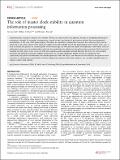| dc.contributor.author | Ball, Harrison | |
| dc.contributor.author | Oliver, William D | |
| dc.contributor.author | Biercuk, Michael J | |
| dc.date.accessioned | 2021-10-27T19:56:19Z | |
| dc.date.available | 2021-10-27T19:56:19Z | |
| dc.date.issued | 2016 | |
| dc.identifier.uri | https://hdl.handle.net/1721.1/133718 | |
| dc.description.abstract | © The Author(s) 2016. Experimentalists seeking to improve the coherent lifetimes of quantum bits have generally focused on mitigating decoherence mechanisms through, for example, improvements to qubit designs and materials, and system isolation from environmental perturbations. In the case of the phase degree of freedom in a quantum superposition, however, the coherence that must be preserved is not solely internal to the qubit, but rather necessarily includes that of the qubit relative to the ‘master clock’ (e.g., a local oscillator) that governs its control system. In this manuscript, we articulate the impact of instabilities in the master clock on qubit phase coherence and provide tools to calculate the contributions to qubit error arising from these processes. We first connect standard oscillator phase-noise metrics to their corresponding qubit dephasing spectral densities. We then use representative lab-grade and performance-grade oscillator specifications to calculate operational fidelity bounds on trapped-ion and superconducting qubits with relatively slow and fast operation times. We discuss the relevance of these bounds for quantum error correction in contemporary experiments and future large-scale quantum information systems, and consider potential means to improve master clock stability. | |
| dc.language.iso | en | |
| dc.publisher | Springer Science and Business Media LLC | |
| dc.relation.isversionof | 10.1038/NPJQI.2016.33 | |
| dc.rights | Creative Commons Attribution 4.0 International license | |
| dc.rights.uri | https://creativecommons.org/licenses/by/4.0/ | |
| dc.source | Nature | |
| dc.title | The role of master clock stability in quantum information processing | |
| dc.type | Article | |
| dc.contributor.department | Massachusetts Institute of Technology. Department of Physics | |
| dc.contributor.department | Massachusetts Institute of Technology. Research Laboratory of Electronics | |
| dc.contributor.department | Lincoln Laboratory | |
| dc.relation.journal | npj Quantum Information | |
| dc.eprint.version | Final published version | |
| dc.type.uri | http://purl.org/eprint/type/JournalArticle | |
| eprint.status | http://purl.org/eprint/status/PeerReviewed | |
| dc.date.updated | 2021-03-30T13:09:50Z | |
| dspace.orderedauthors | Ball, H; Oliver, WD; Biercuk, MJ | |
| dspace.date.submission | 2021-03-30T13:09:51Z | |
| mit.journal.volume | 2 | |
| mit.journal.issue | 1 | |
| mit.license | PUBLISHER_CC | |
| mit.metadata.status | Authority Work and Publication Information Needed | |
